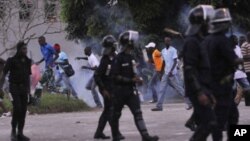A top official of the Economic Community of West African States (ECOWAS) has called on both President Laurent Gbagbo and his challenger, former Prime Minister Alassane Ouattara, to desist from “verbal attacks,” which he said could threaten the country’s peace and stability.
Sonny Ugoh, ECOWAS communications director, described as unfortunate reports that the presidential candidates are engaging in verbal spats during campaigns ahead of Sunday’s presidential run-off vote.
“We have had reasons in the past to talk about the necessity of conducting politics of ideas, (but) not the politics of demonizing (opponents). It’s not going to help anybody. I think what sells, and what they should aspire (to), and what they should engage in, is to tell the citizens what they want to do, so that they can stand on that basis to make an informed decision as to who their preference is,” he said
Civil society groups and various religious organizations have expressed concern that verbal attacks from the presidential aspirants could plunge the country into another round of violence.
Ugoh said both President Gbagbo and Mr. Ouattara should not engage in campaigns of attack that could destabilize the country.
“We will rather encourage the two candidates to canvass ideas (and) to canvass things that will develop their country…and issues that impact on the lives of the people, so that the people can be better informed and can make an informed decision,” Ugoh said.
“While they expect the international community like ECOWAS and others to put pressure on the candidates to ensure that they conduct themselves in a way that encourages peace and stability, the citizens also have a responsibility to also act as pressure groups on these same leaders, to make sure that they conduct themselves (and) in rhetoric that puts the superior interests of their country above narrow interests.”
Meanwhile, Ivory Coast's military leaders say they are deploying additional troops to ensure security for Sunday's presidential run-off election.
About 4,000 troops already were put in place for the first round of voting on 31st October. Officials say half of them are government soldiers and the other half are former rebel fighters.
Army chief General Phillipe Mangou said the soldiers have been instructed to protect voters from intimidation. He said their presence should reassure voters.




